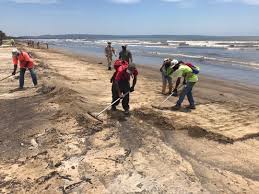
(Javier Corrales, 7.Sep.2020) — The largest oil reserves and one of the world’s most incompetent governments have brought authoritarianism, economic collapse and environmental disaster to the country.
It has been a tough summer for Venezuela. The already ailing country, in the throes of a severe lockdown, is also experiencing a major environmental disaster. In July, a state-owned refinery began to spill oil into the Morrocoy National Park, one of the country’s most biodiverse areas. Venezuela also experienced a new political crisis. The government essentially voided several opposition parties by taking control of their executive boards.
These catastrophes are two sides of the same coin. Rising authoritarianism in Venezuela has led to oil mismanagement, which in turn has led to environmental degradation. And oil mismanagement is now turning the regime even more autocratic, which in turn is leading to opposition debasement.
Pundits often debate whether rising oil fortunes contribute to the rise of authoritarianism. Large oil windfalls, the argument goes, allow states to offer consumption booms to the public in lieu of political rights and to fund repressive forces. But the Venezuelan case seems to be showing that declining oil fortunes can be both a cause and a consequence of hardening authoritarianism.
Venezuela used to be one of the most competitive oil producers in the world. But its oil industry has been run into the ground over the last two decades, first under President Hugo Chávez and now under his successor, Nicolás Maduro. Measured in terms of proven reserves, Venezuela may have more oil than Saudi Arabia. But in terms of output, Venezuela’s oil industry has collapsed. The country’s production of oil is at a 77-year low.
The lesson is clear. Political accountability, human rights and environmental sustainability constitute a modern-day trifecta. Lose the former, and the rest disappears as well.
Mr. Chávez eroded the checks and balances inside and outside the state oil company and turned it into his own A.T.M. Party loyalists replaced oil engineers. Investment protocols were discontinued. Safety standards were ignored. All that mattered was for the oil company to channel dollars to fund the ruling party’s elections.
Not surprisingly, production declined between 2003 and 2014. Oddly, the decline took place at a time when the price of oil price was booming. No freely trading oil nation experienced this strange outcome. While many blame U.S. sanctions under President Trump, the evidence that the collapse was homemade and pre-Trump is overwhelming.
Venezuela’s oil collapse has taken a huge environmental toll. Corruption, underinvestments and weak controls led to the state-owned oil company’s economic collapse. They are also responsible for an increase in company accidents and oil spills. According to a report, the country experienced 46,820 toxic spills from 2010 to 2018, totaling 856,000 barrels of spilled oil. From July to August of this year, an estimated 26,000 barrels of oil may have affected more than 210 miles of shoreline. The July spill is the second major spill in a year. And a few days ago, reports surfaced that a huge oil tanker stationed in Venezuelan waters, the FSO Nabarima, was on the verge of sinking because of a lack of proper maintenance. If it sinks, the resulting oil spill could be five times larger than the Exxon Valdez spill of 1989.
The collapse of oil prices from mid-2014 to early 2016 also deepened Venezuela’s economic crisis, overwhelming the administration of Mr. Maduro. Because production was already so low in 2015, Venezuela’s economy sank more than those of other petrostates. The country’s economy has continued to contract every year since then, leading to a humanitarian and refugee crisis comparable to that experienced by war-torn Syria.
This oil crisis is also producing a hardening of authoritarianism. Under normal circumstances, an economic crisis such as Venezuela’s would have produced one of two political outcomes: a change in policy or a change in government. In Venezuela, it is producing more repression.
For ruling parties, policy changes make sense when the ruling party is interested in staying electorally competitive. But since the mid-2000s, Venezuela’s ruling party has given up on fair elections. It is only interested in staying in office.
So instead of policy corrections, Mr. Maduro has relied on unregulated gold mining (whose toll on the environment and human security is also dismal), crackdowns on citizens’ protests and electoral tricks to disarm the opposition. This culminated in this summer’s nationalization of the opposition parties.
The Constitution of Venezuela mandates that Mr. Maduro schedule a legislative election this year. The government knows it cannot win such an election competing freely, so it has opted to change the electoral rules. The government has expanded the number of seats in the National Assembly from 167 to 277 with the aim of diluting the power of the strongest opposition parties now in control. It has also refused to make electoral authorities impartial and replaced the leadership of opposition parties with people willing to go along with the government. Mr. Maduro has pardoned more than 100 political prisoners, which is a nice concession, but has kept the electoral irregularities in place. These irregularities have split the opposition into two camps, with one sector hoping to compete electorally and another calling for abstention.
The United States is claiming, rightly, that the election is rigged. It may even be encouraging the opposition to abstain rather than unite electorally. The problem is that abstention is exactly what the Venezuelan government wants. The United States may be unintentionally helping the government weaken the once electorally mighty opposition.
The United States has also played a role in the oil spill. While the spill is the result of industry decay in Venezuela, its continuation is connected to the U.S. oil embargo. Venezuela is now precluded from using refineries in the United States to process its oil into gasoline. This is one reason the government has not shut down the damaged refinery: It is the only one in the country that produces gasoline. So the leak has continued, with oil now entering rivers and lakes.
It’s easy to blame factors such as poor vision by the opposition and inconsistent responses by the United States for Venezuela’s turn to incompetent and mean authoritarianism. Those factors are present, but they are not the main drivers. Venezuela’s descent into authoritarianism has the same source as July’s oil spill: Venezuela is a petrostate that has lost interest in accountability.
__________
Javier Corrales, (@jcorrales2011) a professor of political science at Amherst College, is the author, most recently, of “Fixing Democracy: Why Constitutional Change Often Fails to Enhance Democracy in Latin America.”

